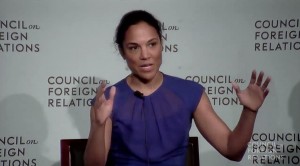By Robert Frank
What has changed in the energy sector? Plenty, according to Helima Croft.
“After they Saudis fired their oil minister Ali Al-Naimi in 2016, they switched from seeking market share to trying to put a floor on prices through active market management,” said RBC Capital Markets’ managing director and chief commodities strategist.
The problem, for now at least, is that whenever crude prices rise to $50 a barrel, American domestic production ramps up.
“Even if the company’s cash flow is negative, at $50, it will still hedge its production,” she said. “That puts a ceiling in prices. The Saudis want oil priced at $60, but having witnessed it sink to $27, they are will to take $50.”
Eventually, this dynamic will run its course, because the shale oil boom stunted long-term investment in conventional extraction.
“We’re still seeing the product of previous investments,” Croft said. “Khazakhstan production is coming online, plus we’re seeing more production from Brazil—but several years out, we’re not going to have additional conventional production. Once shale alone is insufficient to balance the market, we’ll see the prices tighten.”
Nearer term OPEC’s meeting in Vienna, Nov. 30, will prove decisive. If the cartel continues to hold together and extends its supply management agreement from March to June or opts for even deeper cuts, the repercussions will be profound for Canadian producers.
RBC Capital Markets’ managing director and chief commodities strategist Helima Croft
Russia reinforces role
Russia has also engaged in a hitherto-unheard of leadership role, she suggested, having witnessed Russia’s oil minister standing shoulder to shoulder with his Saudi counterpart to announce OPEC’s sea change in policy.
“It went from saying ‘under no circumstances will we cooperate’, to where the Russians effectively co-preside OPEC,” Croft observed.
Another significant wild card is Venezuela. With shrinking GDP, triple-digit inflation, scarce essential goods and a possible famine waiting in the wings, South America’s biggest oil-producer faces imminent economic collapse.
“What does this do to oil production?” she asked. “Petróleos de Venezuela (PDVSA) has about $3.5 billion in sovereign debt coming due now. It doesn’t have the cash to pay that debt. Could PDVSA default? Russia has bailed it out before. I’m inclined to expect that Russia will do so again—but the markets have priced-in default.”
Venezuela also faces the prospect of tighter American sanctions that would further impair its ability to export oil.
“If fewer Venezuelan barrels end up entering the United States,” Croft said, “the net beneficiary will be Canadian heavy.”
American foreign policy toward Iran is another wild card. Non-certification that Iran is compliant with the nuclear deal signed during the Obama administration would means that Congress will have to decide whether it wants to re-impose sanctions. Extraterritorial sanctions would make Iran less attractive to investors and have a noticeable impact on its ability to sell oil and potentially cap its production gains.
This report first appeared in the Fall 2017 edition of Canadian Real Estate
